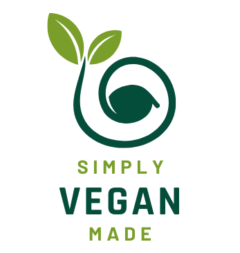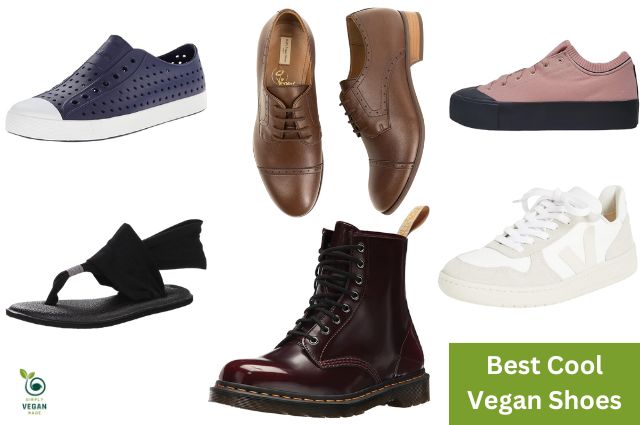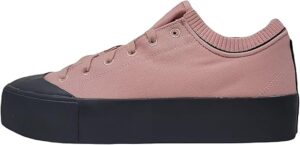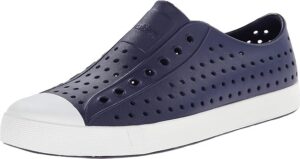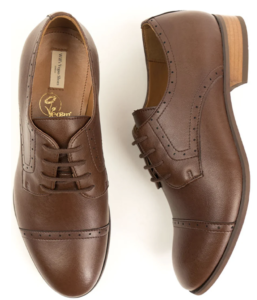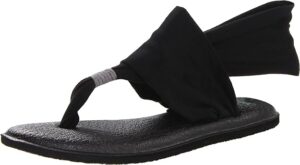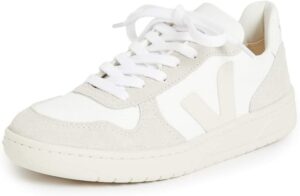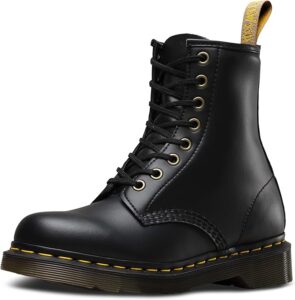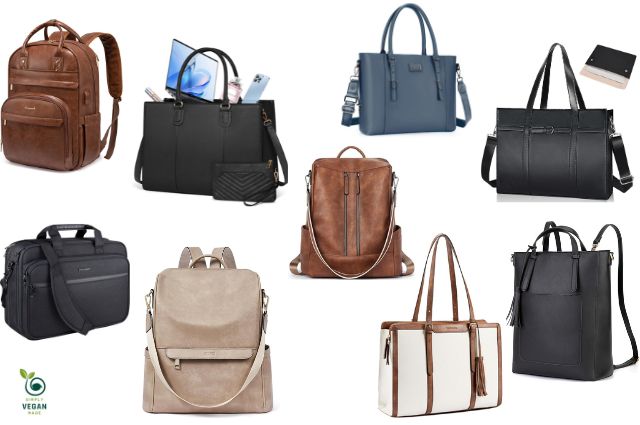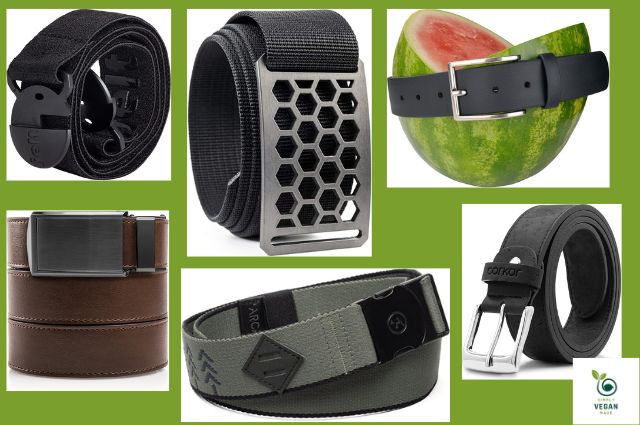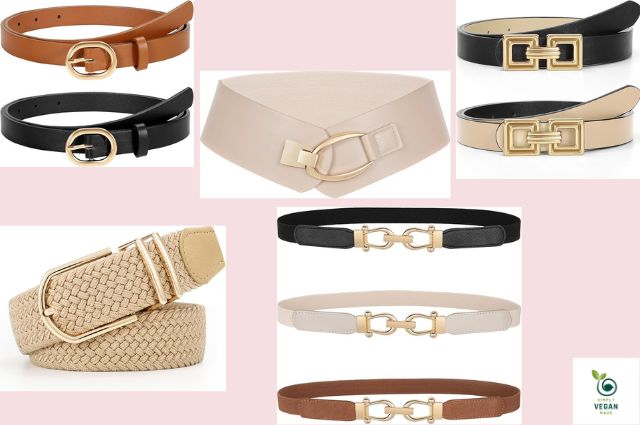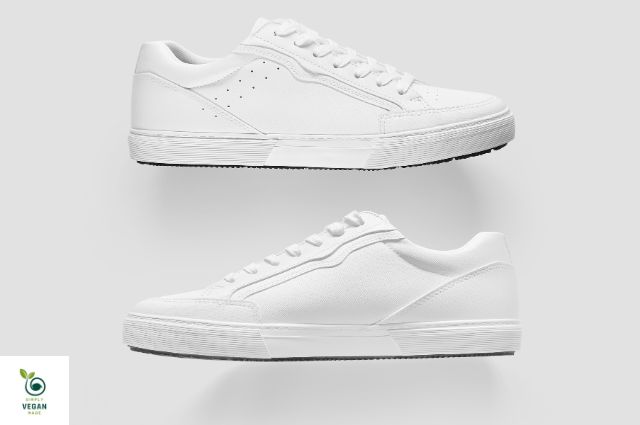The Evolution of Vegan Footwear
When I first started exploring vegan shoes years ago, the options were limited and often uninspiring. Clunky hemp sandals and basic canvas sneakers dominated the landscape.
But oh, how times have changed!
The vegan shoe industry has undergone a remarkable transformation, evolving into a vibrant ecosystem of innovative materials, sleek designs, and forward-thinking brands.
Today’s vegan footwear scene is light-years ahead of it’s humble beginnings. Cutting-edge plant-based materials and sustainable production methods have given rise to shoes that rival their leather counterparts but often surpass them in style, comfort, and environmental impact.
The Science Behind Vegan Shoe Materials
The theoretical underpinning of modern vegan shoe design is rooted in biomimicry – the practice of emulating nature’s time-tested patterns and strategies. This approach has led to the development of materials that replicate the properties of leather while improving upon them in various ways.
One standout example is Piñatex, a material made from pineapple leaf fibers. This innovative fabric uses agricultural waste, creating a closed-loop system that benefits both farmers and the environment.
Piñatex is breathable, durable, and has a unique texture that adds character to any shoe design.
But Piñatex is just the tip of the iceberg. Other breakthrough materials include:
- Mushroom leather: Made from mycelium, the root structure of mushrooms, this material offers a sustainable choice to both animal leather and petroleum-based synthetics.
- Cork: Naturally elastic and moisture-wicking, cork is becoming increasingly popular for shoe soles.
- Recycled ocean plastics: Some brands are turning plastic waste from our oceans into durable, stylish footwear.
- Apple leather: Created from apple industry waste, this material offers a supple texture similar to traditional leather.
These materials aren’t just eco-friendly alternatives – they’re pushing the boundaries of what’s possible in footwear design and performance.
From Concept to Closet: The Vegan Shoe Creation Process
Creating a pair of cool vegan shoes involves a holistic process that considers everything from material sourcing to end-of-life disposal. Let’s break down the key steps:
Material Selection
The journey begins with choosing the right materials. This involves selecting options that offer the perfect balance of performance, aesthetics, and sustainability.
For example, a running shoe might combine a recycled plastic upper with an algae-based foam sole, while a dress shoe could feature a cork-based leather choice and a natural rubber outsole.
Design for Sustainability
The design phase focuses on creating shoes that are truly sustainable, not just vegan. This means considering factors like material efficiency, ease of repair, and recyclability.
Some innovative brands are exploring modular designs that allow parts of the shoe to be easily replaced, extending it’s lifespan and reducing waste.
Ethical Production
Manufacturing is where many vegan shoe brands really shine. Ethical production practices are often a core part of their ethos, including fair labor practices, minimizing waste, and reducing energy consumption.
For instance, Rothy’s has developed a closed-loop production system that recycles water and minimizes waste throughout the manufacturing process.
Marketing and Education
The final step is getting these cool vegan kicks onto feet. This often involves educating consumers about the benefits of vegan shoes and dispelling myths about their performance or durability.
Transparency is key – the best brands are open about their materials and processes, building trust with conscious consumers.
Navigating the Challenges of Vegan Footwear
While the vegan shoe industry has made tremendous strides, it’s not without it’s challenges. Here are some of the hurdles brands and consumers face:
Material Performance
Early vegan shoes sometimes struggled to match the performance of leather in terms of durability, breathability, and comfort. However, advancements in materials science have largely solved these issues.
Many vegan shoes now offer durability that matches or exceeds that of leather shoes.
Scalability
Producing innovative materials at a scale that can compete with traditional leather production remains a significant challenge. However, this hurdle is driving innovation, pushing companies to develop more effective production methods and explore new sources of plant-based materials.
Environmental Impact
While vegan materials avoid animal cruelty, some choices can have their own environmental drawbacks. For example, some synthetic materials are derived from petroleum, contributing to fossil fuel consumption.
To address this, many brands are turning to bio-based materials or recycled synthetics.
Consumer Perception
There’s still work to be done in changing consumer perceptions about vegan shoes. Some people associate them with lower quality or less stylish options.
However, as more high-end and fashion-forward brands embrace vegan materials, these perceptions are rapidly changing.
Vegan Shoes for Every Occasion
One of the most exciting aspects of the vegan shoe revolution is the diversity of styles now available. Whether you need running shoes, work boots, or elegant heels, there’s a vegan option out there.
Let’s explore some categories:
Athletic Shoes
For athletic shoes, look for brands using algae-based foams in their soles. These materials perform well and help clean water systems as they’re harvested. Brands like Vivobarefoot and Adidas (with their Parley line) are leading the charge in sustainable athletic footwear.
Formal Wear
Cork-based leather choices offer a sophisticated look with excellent breathability, perfect for dress shoes and heels. Brands like Nae and Bourgeois Boheme are creating elegant vegan options that wouldn’t look out of place in a boardroom or at a black-tie event.
Casual Everyday Shoes
This is where vegan shoes really shine. From sneakers made with recycled plastic to loafers crafted from pineapple leather, the options are endless.
Veja and Allbirds have become household names in this space, offering stylish and comfortable vegan options for everyday wear.
Outdoor and Work Boots
Traditionally a challenging category for vegan options, brands like Will’s Vegan Shoes and Vegetarian Shoes now offer rugged, waterproof boots that can stand up to tough conditions without using any animal products.
Top Cool Vegan Shoes
Now that we’ve explored the materials, let’s dive into some of the coolest vegan shoes you can buy on Amazon. These selections represent a mix of style, comfort, and sustainability.
1. Adidas x Karlie Kloss KK Women’s Trainer XX92 Vegan Low Shoes
Elevate your style and performance with the Adidas x Karlie Kloss KK Women’s Trainer XX92 Vegan Low Shoes. These sleek, cruelty-free trainers blend cutting-edge design with sustainable materials, featuring a lightweight construction for all-day comfort and a bold look that effortlessly transitions from workouts to casual wear.
Key Features:
- Synthetic & Rubber
- Black toe cap
- Platform midsole
- Pink cotton canvas upper
2. Native Shoes Jefferson Slip-On Sneakers
Lightweight and breathable, these EVA shoes are perfect for summer. They’re water-resistant, easy to clean, and come in a rainbow of colors.
The slip-on design makes them convenient for everyday wear, while the minimalist aesthetic appeals to those who prefer a clean, modern look.
Key Features:
- Lightweight EVA construction
- Water-resistant and easy to clean
- Available in many colors
- Slip-on design for convenience
Customer Reviews:
Users love the versatility and comfort of the Jefferson sneakers. A satisfied customer wrote, “These shoes are my go-to for everything from running errands to beach trips. They’re so comfortable and easy to slip on and off.”
3. Will’s Vegan Store City Derbys
For those in need of a more formal option, these Italian-made vegan leather derbys are an excellent choice. They feature a classic design that’s suitable for office wear or special occasions.
The durable construction and comfortable fit make them ideal for all-day wear.
Key Features:
- Italian-made vegan leather
- Classic derby design
- Suitable for formal occasions
- Durable and comfortable for all-day wear
Customer Reviews:
Many customers appreciate the quality and style of these derbys. One reviewer commented, “I was sceptical about vegan dress shoes, but these have exceeded my expectations. They look great, feel comfortable, and have held up well after months of regular wear.”
4. Sanuk Yoga Sling 2 Sandals
These unique sandals are made from recycled yoga mat material, providing unparalleled comfort. The fabric straps are soft and don’t chafe, making them perfect for long walks on the beach or casual summer outings.
The unconventional design sets them apart from traditional sandals.
Key Features:
- Made from recycled yoga mat material
- Soft, non-chafing fabric straps
- Unique and comfortable design
- Ideal for casual summer wear
Customer Reviews:
Users rave about the comfort of these sandals. A happy customer shared, “These are the most comfortable sandals I’ve ever owned. The yoga mat footbed feels amazing, and I love that they’re made from recycled materials.”
5. Veja V-10 Sneakers
Veja has made a name for itself in the sustainable fashion world, and their V-10 sneakers are a prime example of why. Made from organic cotton and wild rubber from the Amazon, these sneakers boast a stylish retro design that’s become increasingly popular. There are women and men versions of these sneakers.
As a B Corp certified company, Veja is committed to ethical production practices.
Key Features:
- Made from organic cotton and wild rubber
- Stylish retro design
- B Corp certified company
- Ethically produced
Customer Reviews:
Customers love the style and sustainability of Veja sneakers. One reviewer noted, “These sneakers are stylish and align with my values. They’re comfortable, well-made, and I feel good knowing they’re produced ethically.”
6. Dr. Martens Unisex-Adult Vegan 1460 Fashion Boot
Step into iconic style with the Dr. Martens Vegan 1460 Fashion Boot, a cruelty-free classic crafted for durability and comfort. Made with 100% vegan materials, these unisex boots feature a smooth, high-shine synthetic upper, the signature yellow stitching, and a sturdy air-cushioned sole. Perfect for anyone seeking timeless fashion with a conscience!
Key Features:
- Vegan
- Goodyear welt stitching
- Good abrasion resistance
- Slip resistance
- Two tone synthetic leather upper
Customer Reviews:
Customers love the longevity and sustainability of Dr. Martens Unisex-Adult Vegan 1460 Fashion Boot. One reviewer noted, “I’ve used these for work for 3 years now as a construction worker. They are still going strong! The material is unlike any other vegan shoes I’ve seen. Very strong and leathery feeling..”
The Future of Vegan Footwear
As the industry evolves, we’re seeing the emergence of truly circular economy models in shoe production. Brands like On Running are experimenting with subscription models where shoes are returned, broken down, and remade into new pairs.
This level of innovation points to a future where our shoes have as light a footprint on the planet as they do on our feet.
Other exciting developments on the horizon include:
- Biodegradable shoes: Imagine wearing shoes that can be composted at the end of their life cycle.
- 3D-printed custom shoes: Using plant-based materials, some companies are exploring ways to create perfectly fitted shoes on demand, reducing waste and improving comfort.
- Self-repairing materials: Scientists are working on developing materials that can heal small tears or scratches, potentially extending the life of shoes significantly.
- Carbon-negative production: Some brands are aiming to go beyond carbon neutrality, actively removing more carbon from the atmosphere than they produce during manufacturing.
How to Choose the Best Cool Vegan Shoes
With so many options available, how do you choose the right vegan shoes for you? Here are some factors to consider:
- Purpose: What will you be using the shoes for? Running, hiking, office wear, or casual outings?
- Material: Look for sustainable, high-performance materials that suit your needs. For example, breathable options for athletic shoes or water-resistant materials for outdoor use.
- Brand ethics: Research the company’s production practices and overall sustainability commitment.
- Fit and comfort: Just like with any shoes, make sure they fit well and feel comfortable. Many vegan shoe brands offer detailed size guides and generous return policies.
- Style: With the wide range of options available, you don’t have to compromise on style. Choose shoes that reflect your personal aesthetic.
- Price: While some vegan shoes can be pricier because of innovative materials and ethical production, there are options available at various price points.
- End-of-life considerations: Look for shoes that can be easily repaired or recycled when they’ve reached the end of their wearable life.
Caring for Your Vegan Shoes
To get the most out of your vegan shoes, proper care is essential. Here are some tips:
- Clean regularly: Use a soft brush or cloth to remove dirt and dust. For tougher stains, use a mild soap and water solution.
- Waterproof: For shoes made with natural materials, apply a vegan-friendly waterproofing spray to protect against moisture.
- Rotate your shoes: Give them time to air out between wears to prevent odor and extend their life.
- Use shoe trees: For dress shoes, cedar shoe trees can help maintain shape and absorb moisture.
- Repair promptly: Address any small issues like loose stitching or worn soles quickly to prevent bigger problems.
Remember, different materials may require specific care. Always check the manufacturer’s recommendations for best results.
The Impact of Choosing Vegan Shoes
By opting for vegan shoes, you’re making a choice that extends far beyond your wardrobe. Here’s how:
- Animal welfare: The most obvious benefit is avoiding the use of animal products, supporting a cruelty-free lifestyle.
- Environmental impact: Many vegan materials have a lower environmental footprint than leather production, which is associated with deforestation and high water usage.
- Innovation: Supporting vegan shoe brands encourages further research and development into sustainable materials and production methods.
- Health: Some vegan materials are more breathable and less likely to harbor bacteria than traditional leather, potentially benefiting foot health.
- Social impact: Many vegan shoe brands prioritize ethical labor practices and support for local communities.
People Also Asked
What materials are used in vegan shoes?
Vegan shoes are made from a variety of non-animal materials, including synthetic fabrics, plant-based leathers (like Piñatex from pineapple leaves or apple leather), recycled plastics, cork, and natural rubber.
Are vegan shoes durable?
Modern vegan shoes can be just as durable as traditional leather shoes. Advancements in materials science have led to the development of plant-based and synthetic materials that are strong, flexible, and long-lasting.
How do I know if a shoe is vegan?
Look for shoes labelled as “vegan” or “100% animal-free.” Check the materials list for any animal products like leather, suede, or wool. Many brands now clearly state their vegan status on product pages or tags.
Are vegan shoes more expensive?
Prices for vegan shoes vary widely. Some may be more expensive because of innovative materials or ethical production practices, while others are comparable to or even cheaper than leather shoes.
As the market grows, more affordable options are becoming available.
Can vegan shoes be resoled?
Many vegan shoes can be resoled, especially those designed with sustainability in mind. However, it depends on the specific construction of the shoe.
Some brands offer repair services or design their shoes for easy part replacement.
Do vegan shoes breathe as well as leather?
Many modern vegan materials are designed to be breathable. Some, like certain mesh fabrics or cork-based leathers, can even outperform traditional leather in terms of breathability.
Are all synthetic shoes vegan?
While all vegan shoes are synthetic (i.e., not made from animal products), not all synthetic shoes are vegan. Some synthetic shoes may use animal-derived glues or other non-vegan components.
Always check with the manufacturer if you’re unsure.
How do I care for vegan leather shoes?
Care instructions can vary depending on the specific material. Generally, clean with a damp cloth and mild soap, avoid excessive heat, and use a vegan-friendly waterproofing spray if needed. Always follow the manufacturer’s care instructions.
Can I find vegan options for all types of shoes?
Yes! The vegan shoe market now offers options for virtually every type of footwear, from athletic shoes and casual sneakers to formal dress shoes, boots, and even specialized footwear like dance shoes or work boots.
Are vegan shoes better for the environment?
While vegan shoes avoid the environmental impact of leather production, their overall environmental impact depends on the specific materials and production methods used. Many vegan shoe brands prioritize sustainability, using recycled or bio-based materials and eco-friendly production processes.
Key Takeaways
- The vegan shoe industry has evolved dramatically, now offering stylish and high-performance options for all occasions.
- Innovative materials like Piñatex, mushroom leather, and recycled plastics are altering vegan footwear.
- Creating cool vegan shoes involves careful material selection, sustainable design, ethical production, and consumer education.
- While challenges exist, the vegan shoe industry is driving innovation in sustainable and circular production models.
- Choosing vegan shoes can have positive impacts on animal welfare, the environment, and social issues.
